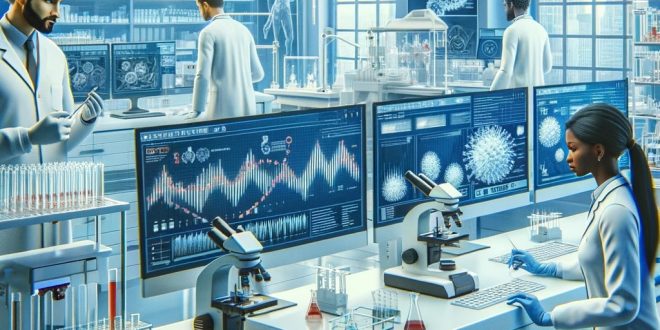Dr. Bodhraj Acharya, PhD, FAACC
In the ever-evolving landscape of healthcare, clinical laboratories stand as unsung heroes in the fight against infectious diseases. From common flu to, COVID to complex pathogens, their role in infection prevention and control is pivotal. These labs are not just about testing; they are about shaping the future of public health with every sample analyzed.
One of the most significant contributions of these laboratories is in the surveillance of antimicrobial resistance (AMR). As antibiotic-resistant bacteria pose a growing global health threat, labs play a critical role in identifying resistance patterns. This crucial information aids in informing treatment strategies and shapes the development of new antibiotics and infection control policies.
Alongside monitoring AMR, these laboratories have embraced advanced diagnostic techniques for the early detection of infectious diseases. Quicker and more accurate detection of pathogens not only aids in early intervention but also in tailoring specific treatment plans. This capability is essential in curtailing the transmission of infections and ensuring timely care. However, the impact of clinical laboratories extends beyond testing and diagnosis. They are also bastions of best practices in infection control. By adhering to stringent protocols, from handling specimens to disinfecting equipment, they ensure that laboratories do not become sources of infection. This commitment safeguards healthcare workers and patients alike, making labs a critical component in the healthcare safety ecosystem. The adoption of molecular typing methods in these settings has brought about a paradigm shift in tracking and controlling infectious disease outbreaks. By precisely identifying pathogens and understanding their epidemiology, these labs provide invaluable insights. This information is key in designing effective infection control strategies and managing outbreaks effectively. In the age of technology, the integration of automation and artificial intelligence in clinical laboratories has further enhanced infection control. These technological advancements reduce human error and improve the efficiency of diagnostic processes. Moreover, AI algorithms help in identifying outbreak patterns and predicting future occurrences, enabling preemptive measures in infection control.
An often overlooked yet critical aspect of laboratory operations is the effective management of waste. Proper disposal protocols are crucial in preventing the spread of infectious agents. Through rigorous waste management, laboratories not only protect the environment but also minimize the risk of infection transmission, underscoring their comprehensive approach to public health safety. The success of these labs in infection control is also a testament to the power of collaboration. The synergy between clinical laboratories and infection control teams is essential for a comprehensive approach to infection prevention. This interdisciplinary collaboration allows for the development of robust infection control measures, adapting to the dynamic nature of infectious diseases.
In conclusion, clinical laboratories are at the heart of infection prevention and control. With their advanced diagnostic techniques, adherence to best practices, and collaborative efforts, these laboratories play an indispensable role in safeguarding public health. As the world continues to face new infectious challenges, the innovations and dedication of clinical laboratories remain central to our collective response.
 Medicosnext
Medicosnext




